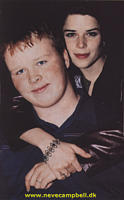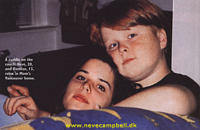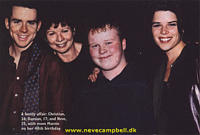In a moving story Neve Campbell tells how she struggled
to help her little brother deal with an incurable disorder
by Neve Campbell
as told to Laura Jamison.

I have so much to celebrate: I’ve starred on six seasons of Party of Five and in a handful of successful movies, including the Scream trilogy and, most recently, Drowning Mona. But an even bigger source of happiness in my life is the fact that my younger brother, Damian, is doing so well these days. He wasn’t always in such good shape.
His troubles started in the summer of the year I turned 16. (I’m now 26.) It was 1989, and I’d just completed a tough year at Canada’s National Ballet School in Toronto, where I’d been studying since I was 10. I was enjoying the break from schoolwork and ballet classes – just being a kid and hanging out. But everything changed when my little brother, Damian, an energetic eight-year-old who’s freckled, red-haired and cute as a button, was diagnosed with a serious illness. Damian had always been sick a lot, suffering asthma attacks that often got so bad, he’d have to wear an inhaler mask for 20-minute stretches. The mask was attached to an air pump that made a huge racket, and sometimes he would have to go through this noisy procedure four times in one day. But that summer was worse. Damian seemed to catch every cold that went around, and he was doing a lot of snorting and wheezing and twitching. We had to keep reminding him to blow his nose. Frankly, he was driving us all a little crazy.
But we didn’t think too much of it; we assumed he was just too busy playing to stop and grab a tissue. Then one evening, Mom witnessed something really unsettling: Damian’s eyes rolled back into his head, as if he were having a seizure.
The Diagnosis
When she asked Damian about it, he pretended to be rolling his eyes on purpose, but she was afraid he might have epilepsy. So the very next day, she took him to Guelph General Hospital to get an EEG (a recording of brain waves). A doctor there confirmed that Damian didn’t have epilepsy. Shortly after, a technician handed my mom a flyer on Tourette Syndrome. That evening, she was on the phone with the Tourette Syndrome Foundation of Canada, which helped her come up with the diagnosis of Tourette Syndrome (TS), a neurological disorder characterized by sudden involuntary movements and repeated vocalizations called tics.
No definite cause for TS has been determined, but research points to an abnormal metabolism in the chemistry of the brain. It occurs three to four times more often in boys than in girls, and a parent with TS has about a 50 percent chance of passing it on to the next generation. There is no cure, but medication can help control the symptoms, which sometimes lessen as people get older.
Soon after Damian’s diagnosis, I landed a role in the Toronto production of The Phantom of the Opera. It seemed so unfair that my life was going well while my little brother was suffering. I felt guilty and helpless, wanting to do something, give him something to make it stop. I think everyone in our family – my mom, Marnie, my stepdad, Mike (Damian’s father), and my older brother, Christian, who is 27 – couldn’t help but feel the same way.
Shame at School
Damian’s tics, which included major neck twitches, snorting, jaw grinding and yelping at ear-piercing volumes, became more pronounced as he approached adolescence. The snorts sounded a lot like he was clearing his throat-but when they happened over and over while his head jerked at the same time, people around him would be visibly unnerved. He also involuntarily made faces and occasionally used bad language-symptoms of a rare TS tic called coprolalia. Damian became so selfconscious that he started having terrible anxiety attacks, which made it hard for him to attend school regularly. Sometimes he’d manage to sit through classes a few days in a row, but more often than not he would suddenly bolt out of the room in a panic and run home. He needed to get away from the kids who stared and giggled when his body twitched uncontrollably.
But how could I blame them? Although Damian and I had always been close, sometimes I didn’t know how to react. Often I’d pretend not to notice his twitches, so he wouldn’t feel self-conscious. I didn’t know what else to do.
To help Damian get through school, Mom started giving educational presentations to his classes so that his teachers and schoolmates would understand what was happening to him. She taught them how to help Damian stay calm and focused, which helped keep his tics to a minimum (stress and anxiety can make them worse). After that, some kids became Damian’s friends and protectors on the playground. But even though his classmates were beginning to understand him, Damian still had to contend with the cruelty of people outside school who weren’t educated about TS.
Facing Prejudice
One summer, when Damian was 12 and I was 19, he and Mom came to visit me near Montreal, where I was shooting a film called Baree. On one of my days off, we all went to see The Lion King. As we were waiting for the film to start, Damian got very excited and started yelping a little bit, emitting sharp “eep” sounds.
As the score played, the “eeps” increased in volume. Within a few minutes, a man sitting behind us tapped Mom on the shoulder and said, “Can’t you make him stop?” Whispering, Mom quickly explained that Damian had Tourette Syndrome and that he’d settle down once he focused on the movie.
But the “eeps” didn’t stop-in fact, they became louder. Another man behind us sighed heavily, and Damian sank into his seat in shame. We moved, but it wasn’t long before the manager asked us to leave because other people in the audience had complained. I’ll never forget following that manager up the long aisle in total disbelief, fighting back tears.

Damian was so upset, his tics worsened. While my mom argued with the manager, I hugged Damian outside the box office. Suddenly, a young woman came running up to the manager, screaming, “You can’t do this! I work with these kids. This is discrimination!” The manager ended up inviting us to see the movie from the projection booth – but it turned out to be useless because you couldn’t hear the soundtrack over the roar of the projector.
When the movie ended, Mom took us to Ben & Jerry’s. Over sundaes, we talked about how stunned, angry and hurt we were, and wondered what we could do to prevent this type of incident from happening in the future-not only to us but to other people living with TS. That’s when I decided to work to educate people about Tourette Syndrome.
Going Public
Because my mother had been an HIV/AIDS educator and counselor, we knew the media can be a powerful tool in raising public awareness of important issues. So once Party of Five gained popularity, we began educating people at TS conferences, participating in annual TS fund-raisers in Toronto and Los Angeles, and getting involved in the production of a film called A Private War about Pete Antico, an actor (Con Air, Lethal Weapon 3) and producer who has lived with TS. Also, last May I had the pleasure of introducing my mom at a fundraiser where she was honored by the Tourette Syndrome Foundation of Canada. Last fall, the foundation named Damian, my mom, Christian and me as its “spokesfamily.”
It feels good to be able to use my success to help others like Damian, to spread the word that people with TS are not crazy or dangerous. In fact, many of these folks are the most creative, talented, bright and funny people I know. It’s been called “the world’s most common unknown disorder.”

Damian, who’s now 18, recently finished high school. He has experienced a remarkable turnaround. About a year and a half ago, he made a personal decision to wean himself off all medications, choosing to live with his tics rather than continue to suffer such side effects as sluggish metabolism, weight gain and lack of energy. He says he’s learned how to control a lot of the symptoms, and now he only emits the odd minor twitch in times of excitement or stress. And there is a bright side to his earlier suffering: While home from school all those years, he became an incredible, self-taught computer whiz. In fact, he was offered a job in the field before he even had his diploma. So he’ll soon be putting his hard-earned skills to use for a computer firm in L.A. (In the meantime, he’s living at home in Guelph, Ont.)
TS has really taught me a lesson about judging people who are different. Now when I see somebody do or say something I don’t understand, I try to look beyond appearances and ask myself what makes that person tick – no pun intended. Think about it: When you keep an open mind about things that seem unusual or strange, all sorts of new understanding comes to you. The world gets bigger, and so do you.
For more information, contact the Tourette Syndrome Association at 888-4-TOURET or visit its Web site at http://tsa.mgh.harvard.edu
Source: “TeenPeople”, April 2000, page 101-104. Used without permission.
OCR’ed by Per from Jeff’s scans using OmniPage Pro 10.0, converted to html and cleaned up by hand, April 11, 2000
